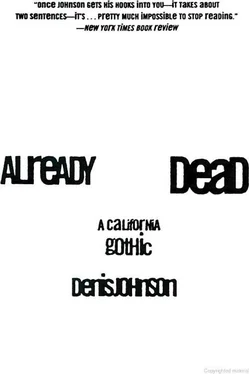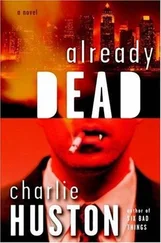Way down there’s something I long for. I don’t think for you it’s possible to comprehend how I wish for this thing, how hungry I get sometimes for this thing I can taste on the wind, when the night carries a sweet teenage music, for a whole history that can’t be mine, a tale of you and me: I’m baffled by school, I play the guitar, I work at the Texaco. I find you on your mother’s porch. You wait for me while I’m in the Army.
Sometimes I can feel it sliding by me like a twisted self in the house of mirrors, and I realize that’s my life, and I am the distortion. There is the world, and here is the mirror. Here the car won’t work and my father lies like granite in his bedroom and the wind scrapes against the grass and the moon goes down leaving such darkness I can’t see my way to walk, and a stranger steps toward me on the road. And the rain that left everything so wet and cold hangs out over the sea in the night miles away with its ghostly tuba and faint horns, playing for the dance of the dead.
And who was the stranger made of shadow? Who came to my car Already Dead / 161
and put his hands through the window and touched my skin and said what’s the matter ?
The killer. Your killer. That is, the one who should have killed you.
— I wasn’t even sure you owned a car, I said.
Please excuse me a second…
The old proprietor just interrupted me elbowing at the door with an armload of kindling and busted up my mood. You might recognize him darling, I’m staying at the little joint where we stopped a year ago last Christmas — or the one before that? — in the very same room, with the fireplace and the ratty bear rug and the stuffed trout on the wall.
The same old boy still runs it, still lives and breathes, still refuses to take that cigarette out of his face, meanwhile frowns at my ascending amber tower of empties. The wheezy old moron. He dislikes me because I suggested that by the look of the pelt maybe his bear had been hunted down with ack-ack. I’m special that way, capable of making a lifelong enemy with one anemic
Navarro loosed more dimes into the dryer’s slot.
The light outside was dying, and so he could see himself reflected in the window. He looked like a man in a Laundromat, but he felt like a man in a darkness, man standing in a tropical sports shirt and brown slacks way down at the bottom of a hole, his strongest identification now with another man who was probably dead and whose words floated slowly past on these pages. He hoped Fairchild hadn’t died. He hoped…but he knew. And yet he couldn’t have said for certain what he knew. In the blackening Laundromat glass Navarro saw the picture of a guy who would never know what had happened during a period roughly between the start of August and the end of September a year ago — particularly the first two weeks of September 1990—to a group of people Navarro couldn’t even be sure about the composition of, but which included the Fairchild brothers and their father; also Winona Fairchild, and Carl Van Ness, and certainly the witch and “channeler,” Yvonne. And possibly one other person who’d also been missing for a long time, an associate of both the Fairchild brothers, maybe a confed-erate or cohort — a local surfer by the name of Clarence Meadows.
162 / Denis Johnson
Around one in the afternoon a dozen or so miles short of the Bakersfield cutoff, just after making the long decline from Wheeler Ridge, Clarence Meadows took a ramp off Interstate 5
and headed into a Coco’s Restaurant in the shadow of the hills for one of those prefab lunches. Lunch with the sheep, as he thought of it. He’d gotten a late start out of Long Beach and wouldn’t make Gualala till midnight anyhow; another thirty minutes wouldn’t matter. And the car’s radio didn’t work, and he wanted to get an update on the real bad news from Kuwait.
He bought a paper in the restaurant and sat at the counter drinking a Pepsi and looking things over: the hostages were leaving Iraq; U.S.
troops still poured into Saudi Arabia.
As for Clarence, the whole idea of ground combat disgusted him. If they refused to make peace, let them use the atom bomb. That was honest warfare.
He laid the paper down and unveiled the squinting face of the man sitting two stools away, who must have been trying to read the back page. Their eyes met. “Here we go again,” the fellow said.
“Another Sunday in paradise,” Meadows agreed.
“No — I mean what’s happening in the papers.” 165
“I wish it was happening in the papers,” Meadows corrected him,
“but it’s happening somewhere over there for real.”
“You think we’ll get all the way into it?”
“Yeah.”
“A real war?”
“Yeah.”
“For oil?”
“When it comes to the price of gas, we’ll nuke the Vatican if we have to.”
The fellow ran an unusual kind of salvage business. He bought old computers in bulk, he told Clarence, and broke them down and hauled the pieces to Southern California. “An obsolete computer’s worth zip.
But there’s a hell of a market for some of the gizmos inside.” Up in Montana he had three airplane hangars full of the stuff. “Hey. You should see my hat,” the guy said, but then failed to explain why or to display anything in the way of a covering for his head. Clarence found the Montanan’s manner soothing. There was a whiff of snake oil about him.
“You do just the opposite of what I do,” Clarence said.
“You build them. You build computers?”
“No, I mean I buy junk in L.A. and put it back together up north.
Classic cars.”
“Where do you sell them?”
“Back down in L.A. It’s really just a hobby.”
“And what do you actually do for a living? Can I ask?”
“No,” Clarence Meadows said.
Meadows was driving back north from L.A., having sold a car for Bill Fairchild and bought this junker and set up deals to sell the dope, his and Nelson Fairchild’s, after it was harvested. Nominally the barter-ing was Nelson’s thing, but Meadows happened to know a couple of music people in Long Beach, and he didn’t see where the arrangement with Nelson was etched in steel.
Fifty or sixty miles north of the Bakersfield cutoff, Meadows pulled to the shoulder long enough to twist a piece of coat hanger around the brake’s linkage, up near the firewall, because the pedal was rattling insanely. While he was down there under the dash he noticed two wires dangling, evidently chewed through by corrosion — he touched the ends together and heard the radio burp. He spliced them 166 / Denis Johnson
with a twist of his fingers, and now the speakers put out a flow of static that sounded promising.
When he raised his head back up to the level of the window, it mys-tified him to see something like a blurry cliff standing over the planet, bulging enormously in its middle, resembling nothing so much as a mushroom cloud and taking up the horizon’s entire northeast quadrant.
What had happened, as he began to understand now, was that a colossal wind had lifted the desert half a mile into the air and kept it hovering there. The dust storm didn’t seem to be moving. But he realized that it must actually be approaching fast. Quickly he rolled up the windows.
His main concern until this minute had been the running condition of the car, a Mercedes 190SL, a beautiful old thing but mistreated, with an unsteady carburetor and a tendency to blow oil out through the manifold seal. Now all of that seemed very secondary as the wind slammed across the road ahead and the car seemed to dive into darkness. Right away he was lost. He couldn’t even see the pavement. Despite the tightly shut windows he tasted dust on his tongue. It itched in his nasal passages, and soon it made his eyeballs feel parched. He messed with the dials on the radio. Nothing reached his hearing but the faint voice of his engine and the fluttering of the wind, a very deep, suggestive sound. He let the car angle gradually to the right until the tires on that side commenced a steady shuddering. He didn’t quite stop, but kept his left tires where he could feel the smooth pavement, the right-hand tires bumping through the dirt, and figured that this way he must be cutting straight along the shoulder, inching ahead so slowly the speedometer didn’t register while the car’s inside heated up and the dust and sweat turned the steering wheel all grimy. The drifting desert earth smelled old and untouched.
Читать дальше












